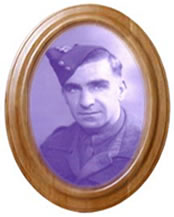
Return To Veterans Accounts Index
Recorded Interview 2
by
Pte. Alfred Raymond Mason 466698
2nd Battalion Royal Berkshire Regiment
.....The
Japanese came up to our perimeter one night and they would start throwing grenades
into where we were, and the following morning we patrolled the area and found
the empty boxes they'd been in. Where we pull the pin out of our grenades
before throwing them, they used to bang it on their chest or something hard,
to prim then, then threw it.
.....The Vultures, they are horrible looking
things, really large terrible things, and of course they used to come down
and feed off whatever was going, they used to clear up the places, they used
to eat the dead and what have you, and that sort of thing, when we couldn't
get to bury them, and that's the sort of thing that went on; terrible to see you know.
.....Being in the signals I had to look after
communications; a severed land line was severed by a shell and off course it
had cut us off, from the brigadier in-charge to the forward troops, so it
was my job to go out and repair that line, I took a reel of wire with me to
repair it, I can always remember it, I'd got it on a kind of iron rail,
with an angled on, and as I was running it out behind be it was making ruddy
noise, of course there was no way of stopping it unless I unrolled it by hand
and it'd take ages, but anyway I got away with that. Anyway I was sitting
there repairing the line; I should have had a couple of men with me, to protect
me while I was doing the job. Well of course we didn't carry a rifle, I had
a pistol, and I had this pistol on me knee just encase and of course I heard
this rustling coming towards me, and I thought, if I'm going I'll take one
or two of them if it's possible, I'd got me gun ready, but fortunately it was
some of our men out on patrol; lucky for me it wasn't the Japs.
.....I remember being an O.P. on this hill,
and the Japs were over on the other side. There was a paddy-filed in-between,
where they grow and cut all the rice; their fixing up their 4" Mortar
and of course I was lying there, and the sun was glaring down on me, and my
face is right down as far as I can get it, onto the earth as you could do,
and your perspiring quite heavily, and that's you, for a couple of hours,
then you got relieved and somebody else took over, and of course you had to
keep down and you couldn't move freely, you were just watching what they
were doing, and passing it back to H.Q., what they were doing, and you could
see them, digging in with their 4” Mortar, and what have you, on the
other side of this valley and then they were also on the other side of the
hill, keeping your head down so they didn't see you and of course the
sun was blaring down, you're lying with face on the earth, and the perspirations
going into the earth and getting onto your face, but that was the least of
our worries as long as you kept your head down. I had a bottle of water and
I had to use that sparing, because drinking with your head on one side. I can't
remember having anything to eat, we used to go, well not days, we used to go
quite a lot without food at all, but when we got back to where we could put
down, you could get something to eat, but most of the time you were going hungry
if you can understand what I mean, but that's how it was. You just lay
there and you watched what was going on and passed a message back, you got
the phone right there, where they were digging in and setting up 4” Mortars,
for us, to shell us and things like that, and of course you kept your head
down, because if they spot you there, they of course had been in Burma for
quite a while, and they'd got all the vital ground zeroed in, they could
pin-point a place, they know the ground.

Pte. Alfred Raymond Mason
